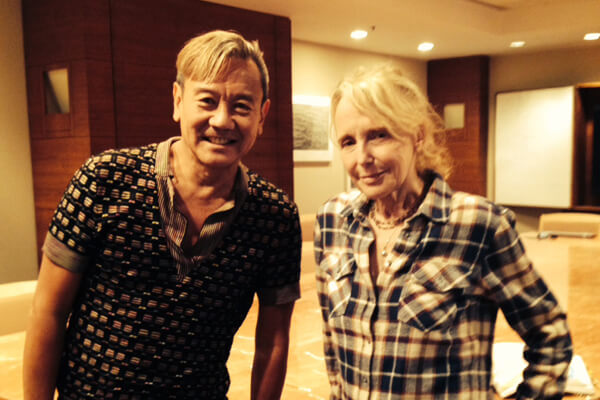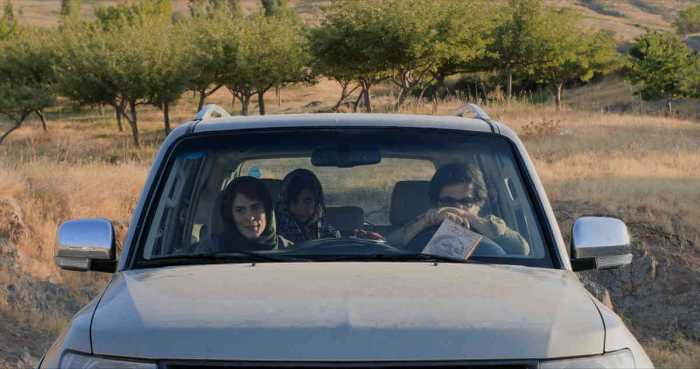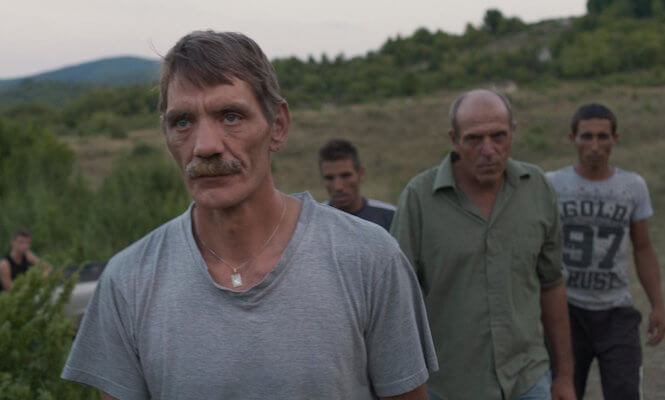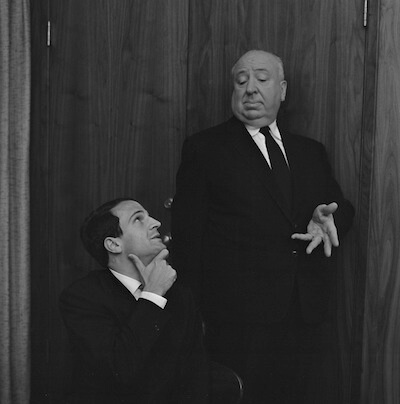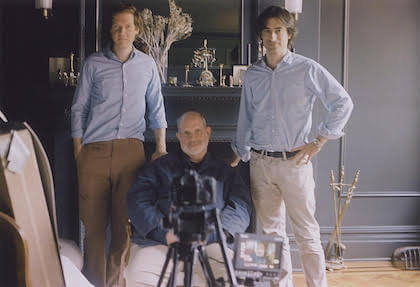Claire Denis and David Noh.
French director Claire Denis has a new film, “Bastards,” which screened at the New York Film Festival, and I jumped at the chance to interview this provocative, ever-surprising auteur, whose previous work includes the highly lauded “I Can’t Sleep,” “White Material,” and “Friday Night.” “Bastards” is a dark-toned policier, featuring Vincent Lindon and Chiara Mastroianni, about a murkily powerful business magnate with a kinky sexual predilection who ruthlessly destroys families.
When I told her I never knew what to expect whenever a new film of hers comes out, the soft-spoken yet intense director, clad in classic dyke plaid shirt chic, said, “I don’t know if my movies are so different from one another. But, always, as I am finishing a film there is some new project in the air, and Vincent Lindon wanted to be in my next one. I don’t see my films as different from one another as I think there is always a continuation in my work, and it had been 10 years since I worked with Vincent in ‘Friday Night.’ I can see why he reminds you of Jean Gabin and also Yves Montand because he is a real man, also in life. If you feel weak, you know you can lean on him and that is important because masculinity in cinema is not only a question of youth and beauty. Masculinity is in the face and the body, and now Vincent is 50. But he was just like this when he was 30.
“It’s not a question of being gay or heterosexual, either. It’s a question of a person considering himself, ‘Okay, I’m a man so what kind of man am I going to be?’ It’s the same with women, I guess, but with women it is more difficult to make a clear choice. They are more locked into their own image, with less freedom, perhaps, although the strongest person in my film is the young girl, who is victimized and walks down the street naked. Hers is the strongest body in the film.
“To film that difficult scene, we waited down the street from her and she was in a little tent, warm. I brought her near the camera and uncovered her and was walking next to her so she was not completely exposed. And it was a street in Paris I chose at night because there are only offices there — no one lives there — so nobody could watch us.”
Laura & Santino, a Gallic Holmes, fall film fare
Denis’ films have often thankfully featured frank, human sexuality and nudity, in stark contrast to the sophomoric attitude toward sex that has traditionally pervaded Hollywood films.
“You know, there are taboos about sex all over the world,” she said. “But because the business of cinema in places like Hollywood is so big, that implies that sexuality has to be treated in a childish way. In countries where the industry of cinema is small, it’s no big deal.”
I remarked on how her film also called up the recent case of Dominique Strauss-Kahn with its powerful man sexually abusing women: “Of course, there is something of that. It was in the air while I worked on this. I didn’t think of him, exactly, but power and sex go well together.
“[In the frank sex scene between Lindon and Mastroianni], my actors trusted me. It was very real and, yes, rough. And filming that was a problem for them, and for me, because I’m shy. And they are shy, but if we do it then we try to do it not in a very realistic way but with a lot of spirit. Chiara is fantastic, and as she gets older she resembles less and less her mother [Catherine Denueve] and more her father [Marcello Mastroianni] . She’s so beautiful and such a great actress too, no?
“She is always different, much more so than her mother, because she is not so iconic like her. Chiara is very secret, very secretive. Her mother came to Cannes for our screening and I was sitting near her and could see that she was kind of shocked to see her daughter acting like this. That was intense.”
I thanked Denis for her very real and honest depictions of gay men, from “I Can’t Sleep” (1994) to her indelible, excruciatingly homoerotic tribute to gay love in the French Foreign Legion in “Beau Travail” (1999): “Thank you, and yes, I know, as you say, that ‘Beau Travail’ has become iconic in the gay community. But this was probably existing before me. Legionnaires were always sexually iconic for women and men. They know this and are very aware of it, because they tried to forbid me to make the film because they are very afraid of that image. I even know a gay nightclub where men like to dress as Legionnaires. I told them, ‘You don’t have to be afraid. I will mention a sort of love between these men that is also spiritual. It won’t be funny or ridiculous like in that nightclub. It’s going to be real.’
“There were 15 men on that set and we had very little time, only four weeks of shooting. I was so afraid of the French army always trying to stop us. I was very nervous, so [even with all those naked men] my libido was not completely free.”
Denis’ narrative sense, always elliptical and multi-layered, which can be confusing, drives some people, in need of an ABCD straight-through storyline, crazy.
“I don’t know why people get crazy about that. ABCD is good when you learn the alphabet or watch a clock, but if you listen to music, read books, or daydream… There is always an intrusion of dreams in me. I’ll be walking in the street and suddenly I’m somewhere else, and I’m not the only one. I think this is part of life and people who complain that they need an ABCD story are liars. They are afraid of something else, their own emotions, and are not very honest.
“Cinema is definitely emotional, and it’s not cinema if you take that for granted. Is it art? I don’t know, but when you are alone in a dark room, the image and sound can take you very far away. When I was a teenager, my first sexual lessons came from film. I need my dream and emotional references and when you make those not so important, it flattens a film. It’s like Muzak in elevators or department stores. That’s not music, but suddenly you listen to real music, and you’re like, ‘Oh!’ I got this last bootleg Bob Dylan album in Paris last month, buying it like an almost religious gesture. I listened to it, and suddenly I said, ‘Ohmigod!,’ and this was not because of my age but for its beauty and emotion.”
On September 23, 54 Below hosted a special benefit for the New York Pops starring the charming “Cinderella” co-stars Laura Osnes and Santino Fontana. It was a bubbly, melody-filled, intimate evening, with the two sharing an easy chemistry as they reminisced about numerous onstage mishaps, ranging from giving each other near-concussions while madly embracing, to slipping crowns and, most direly, having to deal with the wrong shoe! The nostalgia extended even further back to childhood memories of Osnes wishing she had red hair to land the role of “Annie” and singing “You’ve Got Possibilities” to her teddy bear when she was 10, while Fontana recreated a youthful Artful Dodger audition, singing “That’s Entertainment” with a lisp.
Under the direction of Steven Reineke, the Pops has a great season lined up at Carnegie Hall: “Sing, Sing, Swing” pays tribute to the big band era with Montego Glover (Nov. 1); Ashley Brown’s “Under the Mistletoe,” is its Christmas show (Dec. 19-20), and on March 21, “A Broadway Love Story” will feature that favorite White Way couple, Marin Mazzie and Jason Danieley. (Complete information at newyorkpops.org.)
I totally enjoyed seeing Clint Holmes for the first time at the Café Carlyle with his autobiographical show, “Stop This Train” (Oct. 2). Backed by a truly swellegant band with tasty arrangements, his Parisian section was especially winning, with songs like “Michelle,” “C’est Magnifique,” “La Mer,” and “C’est Si Bon” — many of them set to a sultry bossa nova beat — wafting me back to a more elan-filled time, when the City of Lights held a special magic for the cognoscenti of which Holmes was a vibrant, young member, before it was overrun with too many tourists and the inevitable McDo.
Fall in New York is always movie madness time, which got kick-started early by NewFest, immediately followed by the New York Film Festival. Highlights included two very sexual James Franco-generated projects: “Kink,” a doc about the popular B&D website, Kink.com, which focused a tad more on bound and gagged ladies than gents, and “Interior: Leather Bar,” the infamous re-enactment of supposed lost footage from William Friedkin’s notorious “Cruising” (1980). I applaud Franco’s stated desire (at his press conference) for realer, universal depictions of sex on screen, and found “Interior” especially strong, with its focus on the straight male lead (comely Val Lauren, playing Al Pacino) having to come to terms with gay male nudity as coupling is literally thrust in his face.
As it happened, I found myself at odds with many other viewers, who either found it pointless or, worse, were just disappointed that Franco never showed his junk onscreen, and, worse, said so. (Can we raise the level a bit, guys?)
Both Franco films — along with Travis Mathews’ “I Want Your Love” — are commendable for the way they push the envelope of sex in cinema. With the pervasive rise of Internet porn, the world is finally learning, and very quickly, too, about all forms of fucking. Formerly straight-identified men are now experimenting — at a jaw-droppingly rapid rate — with the kind of stuff they either stumble across or surreptitiously seek out on their iPads. Fraidy-cat American movies have to catch up with what is, at last, becoming a simple fact of life: sex. The big prize-winner at Cannes and gem of the New York Film Fest, “Blue is the Warmest Color” (see Steve Erickson’s review), may have been made by a heterosexual Tunisian man, Abdellatif Kechiche, but its portrait of a French lesbian relationship — replete with super-intimate love scenes that have been excoriated as porno and inaccurate from a dyke viewpoint — felt emotionally authentic to me.

